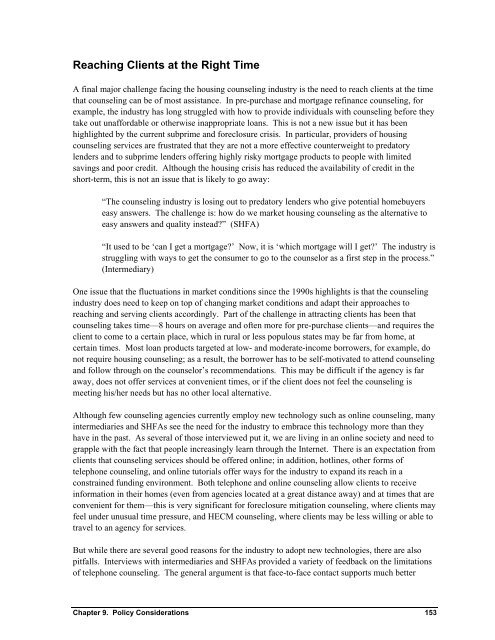Housing Counseling Process Evaluation and Design of ... - HUD User
Housing Counseling Process Evaluation and Design of ... - HUD User
Housing Counseling Process Evaluation and Design of ... - HUD User
Create successful ePaper yourself
Turn your PDF publications into a flip-book with our unique Google optimized e-Paper software.
Reaching Clients at the Right Time<br />
A final major challenge facing the housing counseling industry is the need to reach clients at the time<br />
that counseling can be <strong>of</strong> most assistance. In pre-purchase <strong>and</strong> mortgage refinance counseling, for<br />
example, the industry has long struggled with how to provide individuals with counseling before they<br />
take out unaffordable or otherwise inappropriate loans. This is not a new issue but it has been<br />
highlighted by the current subprime <strong>and</strong> foreclosure crisis. In particular, providers <strong>of</strong> housing<br />
counseling services are frustrated that they are not a more effective counterweight to predatory<br />
lenders <strong>and</strong> to subprime lenders <strong>of</strong>fering highly risky mortgage products to people with limited<br />
savings <strong>and</strong> poor credit. Although the housing crisis has reduced the availability <strong>of</strong> credit in the<br />
short-term, this is not an issue that is likely to go away:<br />
“The counseling industry is losing out to predatory lenders who give potential homebuyers<br />
easy answers. The challenge is: how do we market housing counseling as the alternative to<br />
easy answers <strong>and</strong> quality instead?” (SHFA)<br />
“It used to be ‘can I get a mortgage?’ Now, it is ‘which mortgage will I get?’ The industry is<br />
struggling with ways to get the consumer to go to the counselor as a first step in the process.”<br />
(Intermediary)<br />
One issue that the fluctuations in market conditions since the 1990s highlights is that the counseling<br />
industry does need to keep on top <strong>of</strong> changing market conditions <strong>and</strong> adapt their approaches to<br />
reaching <strong>and</strong> serving clients accordingly. Part <strong>of</strong> the challenge in attracting clients has been that<br />
counseling takes time—8 hours on average <strong>and</strong> <strong>of</strong>ten more for pre-purchase clients—<strong>and</strong> requires the<br />
client to come to a certain place, which in rural or less populous states may be far from home, at<br />
certain times. Most loan products targeted at low- <strong>and</strong> moderate-income borrowers, for example, do<br />
not require housing counseling; as a result, the borrower has to be self-motivated to attend counseling<br />
<strong>and</strong> follow through on the counselor’s recommendations. This may be difficult if the agency is far<br />
away, does not <strong>of</strong>fer services at convenient times, or if the client does not feel the counseling is<br />
meeting his/her needs but has no other local alternative.<br />
Although few counseling agencies currently employ new technology such as online counseling, many<br />
intermediaries <strong>and</strong> SHFAs see the need for the industry to embrace this technology more than they<br />
have in the past. As several <strong>of</strong> those interviewed put it, we are living in an online society <strong>and</strong> need to<br />
grapple with the fact that people increasingly learn through the Internet. There is an expectation from<br />
clients that counseling services should be <strong>of</strong>fered online; in addition, hotlines, other forms <strong>of</strong><br />
telephone counseling, <strong>and</strong> online tutorials <strong>of</strong>fer ways for the industry to exp<strong>and</strong> its reach in a<br />
constrained funding environment. Both telephone <strong>and</strong> online counseling allow clients to receive<br />
information in their homes (even from agencies located at a great distance away) <strong>and</strong> at times that are<br />
convenient for them—this is very significant for foreclosure mitigation counseling, where clients may<br />
feel under unusual time pressure, <strong>and</strong> HECM counseling, where clients may be less willing or able to<br />
travel to an agency for services.<br />
But while there are several good reasons for the industry to adopt new technologies, there are also<br />
pitfalls. Interviews with intermediaries <strong>and</strong> SHFAs provided a variety <strong>of</strong> feedback on the limitations<br />
<strong>of</strong> telephone counseling. The general argument is that face-to-face contact supports much better<br />
Chapter 9. Policy Considerations 153
















